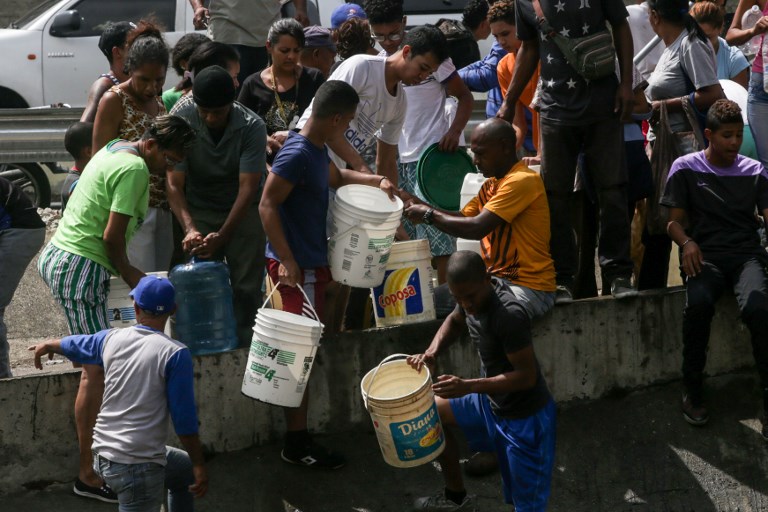
by Maria Isabel SANCHEZ
CARACAS, Venezuela (AFP) — Thousands of Venezuelans marched in fresh protests Tuesday called by opposition leader Juan Guaido on the fifth day of a crippling power blackout as the government of President Nicolas Maduro prepared to charge him with “sabotage.”
Demonstrators banged pots and sounded car horns as the protest got underway in a square in the east of the capital. Many waved large banners calling on Maduro to go.
“The situation is very difficult, we are hoping that this government will change. We’ve had enough of this chaos!” said one of the demonstrators, Miguel Gonzalez.
Guaido — recognized as interim president by more than 50 countries — planned to address the protest later Tuesday, hours after the US said it would pull all remaining diplomatic staff from the crisis-wracked country.
Venezuela’s state prosecutor, Tarek William Saab, meanwhile told reporters he would place Guaido under investigation for “his alleged involvement in the sabotage of the Venezuelan electricity system.”
It is the first government move against the US-backed Guaido since his return to Venezuela last week after defying a travel ban to visit several South American leaders.
Maduro has blamed the blackout on US “sabotage” in the form of an electromagnetic attack on the country’s main hydroelectric complex.
Critics have long blamed the government for failing to maintain the power grid.
Guaido, 35, is seeking to capitalize on public anger over the blackout, which has piled misery on a population suffering years of economic crisis and shortages of food and medicine under Maduro.
The youthful National Assembly leader — locked in a power struggle with Maduro since declaring himself interim president on January 23 — said stopping the socialist leader’s “usurpation” of power would depend “on us demonstrating in a massive and organized way in the streets.”
Outlining the case against Guaido, Saab said the opposition leader had disseminated a series of messages that have “stoked violence.”
“At this moment he appears as one of the intellectual authors of this electrical sabotage and is practically calling for a civil war in the middle of this blackout.”
‘New sanctions’
Maduro has refused to bow to months of international pressure to call fresh elections following a landslide last May was widely seen as rigged.
The US kept up the pressure Tuesday, with its special envoy on the crisis, Elliott Abrams, saying Washington would soon impose “very significant additional sanctions” on institutions doing business with Maduro’s regime.
It has already targeted a growing list of individuals and companies linked to the Maduro government, including state oil company PDVSA.
Prompted by Guaido’s urging, the opposition-dominated National Assembly declared a “state of alarm” on Monday to pave the way for the delivery of international aid, 250 tons of which has been stuck for a month at Venezuela’s borders with Colombia and Brazil.
However, with Maduro controlling the military and security services — which are currently preventing aid from entering the country — he has no means of enforcing it.
Maduro used the military to begin distributing food, water and other assistance in several districts on Tuesday.
Marshalled by security forces, crowds formed impatient lines at water trucks in some areas, as they waited to fill containers. But tensions were running high amid the shortages.
“I saw people lining up for a kilogram of rice, and the shopkeepers had to fire shots in the air to keep the lines under control,” Alberto Barboza, 26, told AFP in the oil capital Maracaibo.
“I heard a lot of shooting,” said Barboza, adding that a local bakery and a tire shop were looted.
The blackout has left millions without running water. Many people lined up to buy bottled water in Caracas supermarkets, but most are reduced to desperate means — besieging fountains in public parks and any available water sources around the capital.
Appeal to the military
Guaido called on the military and security services to “refrain from preventing or hindering” Tuesday’s protests.
Maduro meanwhile called for grassroots groups known as “colectivos” to hit back against what he called attacks encouraged by the US against the country’s electrical grid.
“The time has come for active resistance,” he said in a speech late on Monday.
His call came after armed men on motorbikes were seen riding through areas of the capital at the weekend. The opposition argues the colectivos have been armed by the government and act as militia.
Critics say such groups were behind the death of seven people on February 23 when the opposition tried in vain to bring US-supplied food and medicine across the borders with Colombia and Brazil.
Power has been restored to some areas since the weekend but — with residents and businesses fearing that refrigerated food would spoil — service has been intermittent and the power often drops out.
Businesses and schools remained shuttered Tuesday on Maduro’s orders, as they have been since the blackout began. In any event, the lack of public transport made travel difficult, even in Caracas.
As the situation worsened, US Secretary of State Mike Pompeo announced Washington is withdrawing all its remaining personnel from the US embassy in Caracas. All non-emergency staff were ordered to leave on January 24.
© Agence France-Presse







